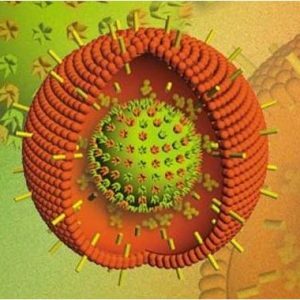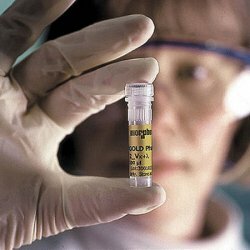Herpes during pregnancy: treatment of different types of herpes, risks to the fetus
 The herpes virus lives in the body of every second person.Pregnant women can catch them both during the gestation of a child, and before.In the first case intrauterine infection occurs in 30-50% of cases, and in the second - in 6%.It is proved that infection of this virus in the first weeks of pregnancy in 30% of women provokes spontaneous abortion, and in the second and third trimesters, 50% have a late miscarriage.Each 4 children who were infected with herpes in utero, there is a latent carrier of the virus and disorders of a dysfunctional nature, manifested with age.70% of newborns are born already sick with herpes, in the case of the mother of his atypical or asymptomatic form.
The herpes virus lives in the body of every second person.Pregnant women can catch them both during the gestation of a child, and before.In the first case intrauterine infection occurs in 30-50% of cases, and in the second - in 6%.It is proved that infection of this virus in the first weeks of pregnancy in 30% of women provokes spontaneous abortion, and in the second and third trimesters, 50% have a late miscarriage.Each 4 children who were infected with herpes in utero, there is a latent carrier of the virus and disorders of a dysfunctional nature, manifested with age.70% of newborns are born already sick with herpes, in the case of the mother of his atypical or asymptomatic form.
Important: every woman should know that herpes during pregnancy can be treated.And they do it at any gestation period.Prevention and therapy should be started as early as possible in order to avoid complications.
The herpes virus begins to activate in the body when the immune defense of the body goes down.Pregnant women in this regard are particularly vulnerable.
Table of contents:How dangerous is herpes in pregnancy?
During pregnancy, a woman must pass a blood test for TORCH infection, which is considered the most dangerous for her unborn child.Two of them are genital herpes and cytomegalovirus.They are both herpes varieties and do not have a negative effect on the woman herself, unlike the fetus.Passing the placental barrier, these viruses negatively affect the future child.The consequences of such infection depend directly on the gestational age and the period of pregnancy.
Risks to the fetus
The teratogenic effect of the virus is highest in the first trimester, when the placenta has not yet been formed, resulting in the formation of various defects in many organs and systems.The main targets are the nervous and cardiovascular system, the liver. When a child is infected, development of such pathologies is possible:
-
 hydrocephalus;
hydrocephalus; - meningoencephalitis;
- hepatitis;
- is not an infection of the oval window;
- myocarditis;
- development delay;
- blindness;
- epilepsy;
- jaundice;
- lesions of the central nervous system;
- hepatosplenomegaly;
- deafness;
- hemorrhagic syndrome.
Note: The probability of contracting herpes from the fetus during pregnancy is actually not that high.The maximum danger is a primary infection with the 2 types of the mother's virus, when the risk of transmission is 50%, as well as the period of exacerbation of the herpes in a chronic form when it is released into the blood.
Usually, the infection occurs in the period of childbirth, both natural and with caesarean section.
Risks for the mother
In a pregnant woman, herpes can cause such complications:
- abortion in the form of early and late abortion;
- fetal fading;
- the birth of a dead child;
- premature delivery.
 is especially dangerous when is pregnant with , then the fetus is already dead, but there was no rejection and expulsion from the uterine cavity.In this case, a woman can feel normal, while the products of the embryo decay cause an intoxication of the female body.This provokes thrombosis, endometritis, bleeding.
is especially dangerous when is pregnant with , then the fetus is already dead, but there was no rejection and expulsion from the uterine cavity.In this case, a woman can feel normal, while the products of the embryo decay cause an intoxication of the female body.This provokes thrombosis, endometritis, bleeding.
Still, the birth of a healthy child in the presence of herpes is quite realistic, because the main factor in protecting the fetus in this case is the antibodies of the mother to the virus, which act even after birth for several months.
Herpes of the 1st type during pregnancy and its treatment
 He is a herpes simplex virus that shows up on the mucous membranes and skin near the lips, nose.The rash has the appearance of bubbles with fluid that cause itching and pain, and when opened, they leave erosions and crusts.Often for the first time it manifests in women precisely in the period of gestation.There is no direct threat to the fetus in this situation, but there is also no 100% guarantee that the virus does not enter the body by hematogenous way.
He is a herpes simplex virus that shows up on the mucous membranes and skin near the lips, nose.The rash has the appearance of bubbles with fluid that cause itching and pain, and when opened, they leave erosions and crusts.Often for the first time it manifests in women precisely in the period of gestation.There is no direct threat to the fetus in this situation, but there is also no 100% guarantee that the virus does not enter the body by hematogenous way.
In the presence of a single eruption on the lips of a woman, do not worry, since this is not a terrible threat to the developing child.In such cases, a mechanism of natural immune defense is sufficient, which will defeat herpes.
In any case, in the presence of herpetic eruptions of any location, it is worthwhile to visit a doctor, so that he assesses the real risk for the fetus and, if necessary, prescribes therapy.Usually, treatment is reduced to increasing the immunity of a woman by prescribing immunoglobulins that are allowed during pregnancy, as well as B vitamins.
There is no drug that can cure herpes.The used means allow to prevent the occurrence of rashes and their spreading.In particular, local treatment is prescribed in the form of applying Panavir gel, which is one of the few drugs allowed for use during pregnancy.It is applied to the rashes up to 5 times a day.From the traditional medicine use cauterization infusion propolis, fir oil, vitamin E( pharmacy), Interferon.
Herpes 2 types( genital herpes) during pregnancy and its treatment
 Genital herpes affects the mucous and skin of the genitals.The character of the rash is the same as in the case of type 1, the difference is exclusively in localization.Danger is the primary infection of a future mother by this type in the period of pregnancy.In this case, the disease has a severe course with complications.Secondary infection occurs when a woman was a carrier of genital herpes before the onset of pregnancy.
Genital herpes affects the mucous and skin of the genitals.The character of the rash is the same as in the case of type 1, the difference is exclusively in localization.Danger is the primary infection of a future mother by this type in the period of pregnancy.In this case, the disease has a severe course with complications.Secondary infection occurs when a woman was a carrier of genital herpes before the onset of pregnancy.
Important: Clinical and laboratory confirmed type 2 herpes in a pregnant woman is a contraindication to natural childbirth.
In this case, the maximum risk of contracting herpes from the fetus is present in the delivery period.Passing through the birth canal of a mother who is sick with genital herpes, the newborn will most likely eventually become ill with herpetic pneumonia, meningitis, etc.
With confirmed type 2 herpes during pregnancy, especially if it was detected for the first time, the doctor will prescribe treatment.It will help stop the reproduction of the virus, thereby reducing the likelihood of its transmission to the fetus.In practice, antiherpetic drugs are shown during an exacerbation after 36 weeks. Usually prescribed:
- Famciclovir;
- Valaciclovir;
- Acyclovir.
The dosage, multiplicity and method of application is always determined individually by the treating physician.The course of therapy is up to 2-3 weeks.The above-described drugs belong to the B class of safety during pregnancy.That is, during the study on animals, their negative impact on the fetus was not noted, but there are no precise data on their effect on pregnancy in humans.
Herpes simplex type( chickenpox) during pregnancy and its treatment
This type of virus causes primary varicella at primary contact, and if the woman has already had it, then herpes zoster or herpes Zoster in the secondary.In the first case, there will be a picture of a characteristic rash all over the body, with itching, and erosions in place of the blisters.In the second - the rash appears along the course of large nerves( on the abdomen, back, limbs, head) and causes a strong pain syndrome.
The real threat exists if a woman suffers from chickenpox for the first time during pregnancy, as she does not have active immunity to this disease.
Note: studies have shown that chickenpox in a pregnant woman after contact with a patient it is more dangerous for the fetus than chickenpox that developed as a result of contact with the affected shingles.
This is why, when a rash similar to herpes zoster occurs, it is important to contact the infectious diseases specialist as early as possible.When the diagnosis is confirmed, the use of Acyclovir is indicated to stop the reproduction of the virus in order to reduce the risk of complications.Also, in the absence of immunity to chickenpox, the introduction of anti-herpes serum is indicated, especially if the woman had contact with a sick chickenpox or herpes zoster.For its introduction to be effective, it should be done within 4-5 days after contact with the patient.
4 herpes type( Epstein-Barr virus) during pregnancy and its treatment
 This type causes the pathology like the Epstein-Barr virus.The latter in turn provokes an infectious mononucleosis.Getting into the body, it remains in it forever, and periodically makes itself felt with a decrease in immune defense.It affects internal organs, nerve and lymphatic tissues, it is characterized by a lingering course.
This type causes the pathology like the Epstein-Barr virus.The latter in turn provokes an infectious mononucleosis.Getting into the body, it remains in it forever, and periodically makes itself felt with a decrease in immune defense.It affects internal organs, nerve and lymphatic tissues, it is characterized by a lingering course.
It is more dangerous to infect it during pregnancy than before it, as the consequences in this case can be completely different.This is due to the fact that the presence of antibodies to the virus in the mother's blood will protect the fetus upon repeated contacts with herpes of this type from developmental defects, intrauterine death.If the Epstein-Barr virus is in a latent form in a woman, then it does not cause miscarriages and fetal anomalies, it is not transmitted to the child.That is, it has an asymptomatic course or a typical pattern of acute respiratory viral infection of mild degree.
In 0.1% of infected women against the background of already existing immunodeficiency, it proceeds in acute form and is called infectious mononucleosis.As a result, there may be a recovery, a chronic infection, or an asymptomatic virus.Everything depends on the state of immunity of the pregnant woman. In respect of the fetus, EBV can trigger such pathologies:
- chroniosepsis of recurrent type;
- premature termination of pregnancy;
- affection of the nervous system;
- hepatopathy;
- fetal hypotrophy;
- pathology of the organs of vision;
- respiratory distress syndrome.
With intrauterine infection of the fetus and latent infection, after birth, the child may develop lymphadenopathy, chronic fatigue syndrome, hepato- and splenomegaly.Treatment is carried out only in the case of clinically significant symptoms in the hospital.
5 herpes type( Cytomegalovirus) during pregnancy and its treatment
This is a cytomegalovirus that has a greater tropism to the spleen, liver, and nerve tissue.This type of herpes can adversely affect pregnancy, as it penetrates the placental barrier.The main ways of its transfer: contact and airborne.Today, often the cause of death of newborns and neonatal pathologies is cytomegalovirus.He provokes the development of a variety of vices:
- development delay;
- underdevelopment of the brain;
- rash on the skin;
- damage to the hearing aid;
- damage to the organs of vision;
- pneumonia and other diseases of the respiratory system;
- inflammation of the gastrointestinal tract.
When confirming the presence of type 5 herpes in a pregnant woman up to 12 weeks, an artificial interruption is indicated.In the future, immunocorrection, restorative drugs, and symptom management are used.
Betsik Julia, obstetrician-gynecologist



